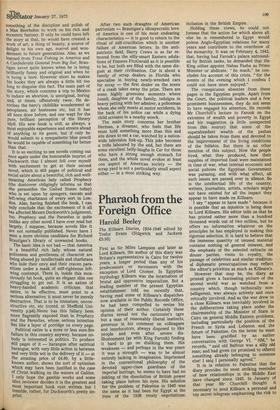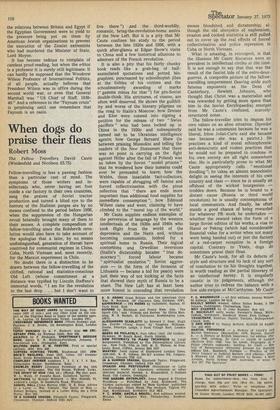Pharaoh from the Foreign Office
Harold Beeley
The Killearn Diaries, 1934-1946 edited by Trefor Evans (Sidgwick and Jackson £5.95) First as Sir Miles Lampson and later as Lord Killearn, the author of this diary was Britain's representative in Cairo for twelve years, a longer period than any of his predecessors or successors with the exception of Lord Cromer. In Egyptian mythology Killearn was the incarnation of brutal and oppressive imperialism. But a leading member of the present Egyptian establishment told me recently that, having read some of Killearn's dispatches now available in the Public Records Office, he •had been compelled to revise his opinion of their author. Certainly these diaries reveal not the cartoonist's ogre but a man of reasonably liberal instincts, generous in his comment on colleagues and interlocutors, always disposed to like people and even after severe disillusionment (as with King Farouk) finding it hard to go on disliking them. His weakness — and perhaps in the war years it was a strength — was to be almost entirely lacking in imagination. Imprisoned in the conventional philosophy of the devoted upper-class guardians of the imperial heritage, he seems to have had no inkling of the dissolution of British power taking place before his eyes. His solution for the problem of Palestine in 1945 was the same as it had been for Egypt at the time of the 1936 treaty negotiations: inclusion in the British Empire.
Holding these views, he could not foresee that the action for which above all else he is remembered in Egypt would poison Anglo-Egyptian relations for many years and contribute to the overthrow of the monarchy. It was on February 4, 1942, that, having had Farouk's palace surrounded by British tanks, he demanded that the King either appoint Nahas Pasha as Prime Minister or abdicate. "So much," he concludes his account of this crisis, "for the events of the evening which I confess I could not have more enjoyed."
The conspicuous absentee from these pages is the Egyptian people. Apart from the Court, the political leaders and a few prominent businessmen, they do not seem to have engaged his attention. He records Mr Churchill's lecture to Farouk on the extremes of wealth and poverty in Egypt and his suggestion (a little unexpected from this source) that some of the superabundant wealth of the pashas should be taken from them and devoted to the improvement of the living conditions of the fellahin. But there is no other mention of this subject. How the people lived, what they produced, how their supplies of imported food were maintained in time of war, what internal economic and social policies the Egyptian Government was pursuing, and with what effect, all such issues are passed over in silence. So is the intellectual life of the country; writers, journalists, artists, scholars might not have existed for all the impact they appear to have made on Killearn.
I say "appear to have made" because it is possible that an injustice is being done to Lord Killearn. His editor tells us that he has printed rather more than a hundred thousand words out of two million, but he offers no information whatever on the principles he has employed in making this rigorous selection. It is hard to believe that the immense quantity of unused material contains nothing of general interest, and the emphasis of the selected extracts on dinner parties, visits to royalty, the passage of celebrities and similar traditional diplomatic preoccupations may reflect the editor's priorities as much as Killearn's.
However that may be, the diary as printed gives a fascinating picture of the second world war as watched from a country which, though technically nonbelligerent, was always actively and once critically involved. And as the war drew to a close Killearn was inevitably involved in the deliberations taking place under the chairmanship of the Minister of State in Cairo on general Middle Eastern problems, including particularly the position of the French in Syria and Lebanon and the future of Palestine. On the latter he must have been gratified by an earlier conversation with George VI. "HM," he records, "said old Balfour was a silly old man; and had given (or promised to others) something already belonging to someone else! I said I personally agreed." It is in relation to Palestine that the diary provides its most striking reminder of how relationships in the Middle East have changed since 1945. In January of that year Mr Churchill thought it necessary to send Killearn a personal and top secret telegram emphasising the risk to the relations between Britain and Egypt if the Egyptian Government were to yield to the pressure being put on them by American Jewish organisations to prevent the execution of the Zionist extremists who had murdered the Minister of State, Lord Moyne.
It has become tedious to complain of careless proof-reading, but when the editor is a professor it is surely still legitimate. It can hardly be supposed that the Woodrow Wilson Professor of International Politics, of all people, actually believes that President Wilson was in office during the second world war, or even that General Marshall was "US Chief of Staff, 193949." And a reference to the "Fayoum crisis" is perplexing until one remembers that Fayoum is an oasis.



































 Previous page
Previous page